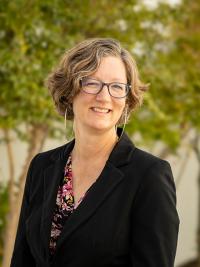Crump aims to improve food in rural markets
Nepal project lands $900K grant

People in rural regions like mountainous Nepal produce plenty of food. But before it can get to local markets and into people’s homes, much of it spoils. What’s left often has lost much of its nutritional value. Now, Amanda Crump and team are working on a way to get more nutritious food into the homes of Nepalese people
A grant of nearly $900,000 will support a two-year project to introduce special packaging and systems for cold and dry storage into rural Nepal’s market chain. Crump thinks she can prove these innovations will increase the income of fruit and vegetable farmers and sellers, decrease food loss, improve food safety and make more nutritious food available for shoppers. She is an associate professor of teaching in the UC Davis Department of Plant Sciences.
Food spoils when it’s around oxygen. Crump’s plan includes introducing machines that wrap food and fill the little packages with an inert gas such as nitrogen. It's called modified atmosphere packaging; it extends the food’s shelf life and nutrition, while decreasing the growth of harmful bacteria that can make people sick.
Her plan includes a “strong private-sector partnership model (that) empowers women, youth and communities and promotes nutrition and resiliency,” Crump wrote. After two years, the lessons learned would be applied elsewhere.
The project is being funded with $876,000 from Feed the Future’s Food Systems for Nutrition Innovation Lab. It’s part of the United States government’s program to promote food security around the world. The Crump team will work with the nonprofit organization International Development Enterprises (iDE). Their grant is one of five experimenting with food storage and packaging innovations. Together, their goal is to test whether strategies are cost-effective and could be shared around the world.

Media Resources
- Trina Kleist, UC Davis Department of Plant Sciences, tkleist@ucdavis.edu, (530) 754-6148 or (530) 601-6846
